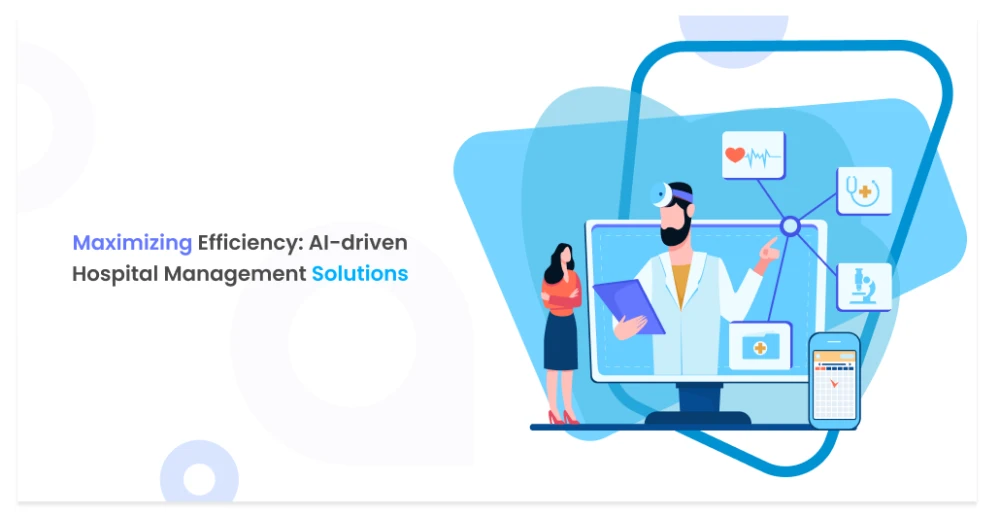Table of Contents
Introduction:
In today’s advanced and dynamic world, the need for better and more effective clinic management systems and Hospital Management System is the real need of the hour. Welcome to the time when hospitals no longer need to wonder how to improve their management; they need only embrace AI. I picture a scenario where Artificial Intelligence is used in healthcare organizations to efficiently complete bureaucratic tasks, in a way that overhauls medical assets and makes patients wait shorter amounts of time than they do now.
In this process of change, AI plays the invisible role of the assisting power that synthesizes data patterns, patient throughput, and practical recommendations to the executive decision-makers in healthcare. However, this is not merely a matter of mathematical calculations or computer codes: it is about enriching the quality of life of patients and inhabitants of medical institutions.
The Evolution of Hospital Management Systems
Hospital management systems have grown to be a health system that automates the general health system regime from manual to digital. Such early systems were very low-level and only encompassed core secretarial and administrative activities, while present-day add-on modules synchronized well with Hospital Information Management System to optimize functionality.
An important advancement in recent years is the introduction of artificial intelligence-based hospital queue management systems, aimed at reducing the time spent by the patients in the wards and improving the utilization of resources. It is highly significant to note this advancement in the technological aspect, as well as how it plays an even more crucial role in presenting a more customer-oriented and efficient healthcare industry, especially showcasing the dynamic transition of hospital management.
AI in Hospital Management Systems
Amidst the ever-growing and competitive healthcare market, AI plays the role of an unseen yet very effective player in enhancing hospital management systems (HMS) as well as the overall story of health issues, especially in places like HMS India. Here's a glimpse into how AI is redefining hospital management system modules: Here's a glimpse into how AI is redefining hospital management system modules:
- Empowering Patient Data Management: Through patient records and updating, AI-based systems ensure that every healthcare practitioner involved in a patient’s life has a complete history and profile to work with. This is not only ideal in terms of time management, but it also encourages a more individualized treatment process.
- Elevating Appointment Scheduling: Faster appointments: Reducing time to schedule an appointment with the doctor and decreasing the difficulties in attending an appointment with the help of AI. This is all important to maintaining the work of the hospital management system in India which has a thriving traffic of patients and where timely attention for all of them is priceless.
- Improving Situations of Patient Schedules at a Hospital: AI brings efficiency in managing patient traffic where and when to form a queue, and how to do it to reduce patient density and waiting time. This keeps the environment in health facilities structured and promotes order, hence uniqueness and improvement of patient experience.
- Smart Resource Allocation: Using pattern recognition tools created by AI technology, data on the admissions of patients can be predicted and accurately forecasted to ensure that hospitals can strategically plan for staffing, beds, equipment, and other critical aspects that would tailor the facility to patients’ needs.
Key Components of AI-driven Hospital Management Solutions
Advanced AI methodologies enable the workings of hospital management systems online are clever and reverberate in cost-effective forms. By incorporating these components, these systems can organize these resources achieving efficiency in the provision of patients’ care and the use of the workforce.
Additionally, with the implementation of Hospital Management Software through the use of AI, there is improved communication between the stakeholders in the healthcare sector hence enhancing teamwork as well as ensuring that patients receive the right attention at the right time. Implementing technology in scheduling, and managing stocks or appointments can free the employee's time, enabling them to concentrate on providing the much-needed care to the patients which in turn will be satisfying to the patients.
We can conclude that the benefits of the integration of AI into hospital management systems are vast. From predicting the likelihood of an outbreak or monitoring excessive use of a drug to delivering the best treatment regimen based on patient’s records, AI decision supports healthcare decision making hence enhancing healthcare.
Conclusion:
AI’s are the pulse of the health system and the hospital management system is the epitome of groundbreaking advancement in technology revolutionizing efficiency and patient care. Such systems minimize reporting complexities, provide tailored information, and agree on resource management, thus transforming the context of healthcare procurement. As we embrace the prospects of hospital management systems, let’s begin a journey where each click, each decision, and every innovation at the hospital level is a journey towards more efficiency on the one hand, better healthcare, and the well-being of all patients.















 +91
+91